How to Stop Stress Eating

Feeling Stressed? You’re Not Alone When life feels overwhelming, it’s easy to turn to food for comfort. Stress, anxiety, exhaustion—it can all lead to mindless snacking or emotional eating. If you find yourself reaching for food when you’re not truly hungry, you are not alone. And more importantly, you deserve other ways to care for yourself that actually help you feel better. Food might feel like the easiest way to soothe stress, but it’s temporary. Real comfort comes from addressing what you truly need. Here are three simple ways to stop stress eating: 1. Start with Gratitude When stress hits, it’s easy to focus on what’s wrong. A simple shift toward gratitude can help break the cycle of emotional eating. Try this quick practice: Take a deep breath. Name three things you’re grateful for—big or small. Let that gratitude fill your mind and body for a moment. Gratitude helps ground you in the present, making it easier to respond to stress in a way that actually feels good. 2. Take a 10-Minute Break from the Urge to Snack Cravings often come in waves and pass if you give them time. Instead of immediately reaching for food, take a short break and do something else for 10 minutes: Step outside for fresh air. Listen to a song that lifts your mood. Do a short breathing exercise. Often, by the time the 10 minutes are up, the urge to snack has passed, and you’ll feel more in control of your choices. 3. Move Your Body to Release Stress When emotions build up, movement is a powerful way to release them—without food. Try: Stretching for a few minutes. Shaking out your arms and legs to let go of tension. Dancing to your favorite song. Movement doesn’t have to be a workout. It’s just about reminding yourself that your body is strong and capable, and that you can handle stress in a way that supports you. You Deserve True Comfort Eating to soothe stress is understandable, but it doesn’t solve the problem. In fact, when you choose to stress eat, it temporarily distracts you from the stress but adds more later as you feel overly full or gain weight. You deserve real comfort—comfort that lasts beyond the moment. By trying these small, simple shifts, you can begin to create new ways to care for yourself without relying on food to relieve your stress. The next time stress hits, pause. Breathe. Choose something that truly helps you feel better. You are stronger than you think. Need More Support? If you’re looking for more ways to manage stress, take care of yourself, and lose weight in a way that feels good, I’m here to help. Let’s do this together. Click here to schedule a call with me. Your Coach, Andrea
Four tips to Stop Nighttime Snacking
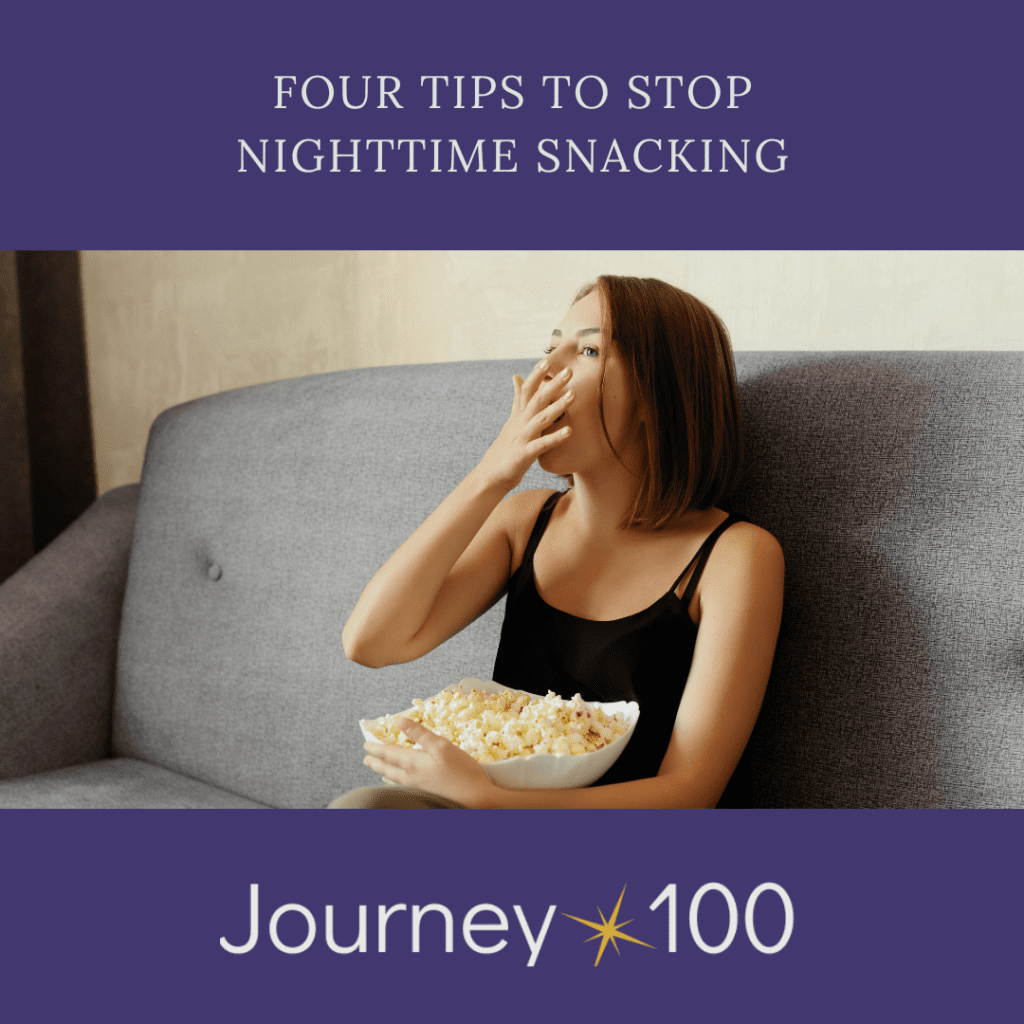
So many women I work with are stay on plan breakfast and lunch but go off the rails in the evening. They succumb to nighttime snacking to unwind from the day but it also undoes their weight loss. Here you will learn four tips to stop nighttime snacking and consistently lose weight: Reconnect With Your Why Instead of focusing on stopping nighttime snacking, it is helpful to focus on what you want: lose weight! Before you snack, stop and think about why you want to lose weight. Do you want to be healthy for your kids? Feel better in your clothes? Have more energy? Remind yourself of your why. Picture how proud you’ll feel in the morning when you stick to your plan. Create a New Evening Habit A lot of nighttime snacking is just a habit. This is great news because habits can be formed and destroyed. It’s as easy as doing something else instead! It can be as easy as choosing to watch TV in a different chair to change your habit. You can also sip a cup of tea, take a warm bath, or write down three things you’re grateful for. Find something that feels good and helps you relax without food and before you know it, you’ll be getting closer to your weight loss goal. Out of sight, Out of mind Don’t leave snacks where you can easily see them. At the end of the day, you are often emotionally and physically drained. Seeing crave-worthy foods is a recipe for caving-in. Often times, you don’t have the mental bandwidth to tell yourself no. Put snacks in hard-to-see places or don’t buy them at all. Instead, keep healthy options around like veggies, fruit, or yogurt if you really need something to eat. Set a Kitchen Curfew The final tip is to pick a time when the kitchen “closes” for the night. Wipe the counters down and start the dishwasher. If you need to, put a chair in the doorway to keep you out. After that, brush your teeth or chew gum. It’s a simple way to remind yourself that eating is done for the day. Remember nighttime snacking is just a habit. Just something you’re used to doing. And it can be changed. You won’t cut nighttime snacking in one try. Try one or all of these tips to stop nighttime snacking and before you know it, it will be a thing of the past. Be patient with yourself and celebrate all your wins! And remind yourself that you are evolving into that future version of yourself that is living and loving her goal weight life! You’ve got this! Your Coach, Andrea
How to end weight loss misery
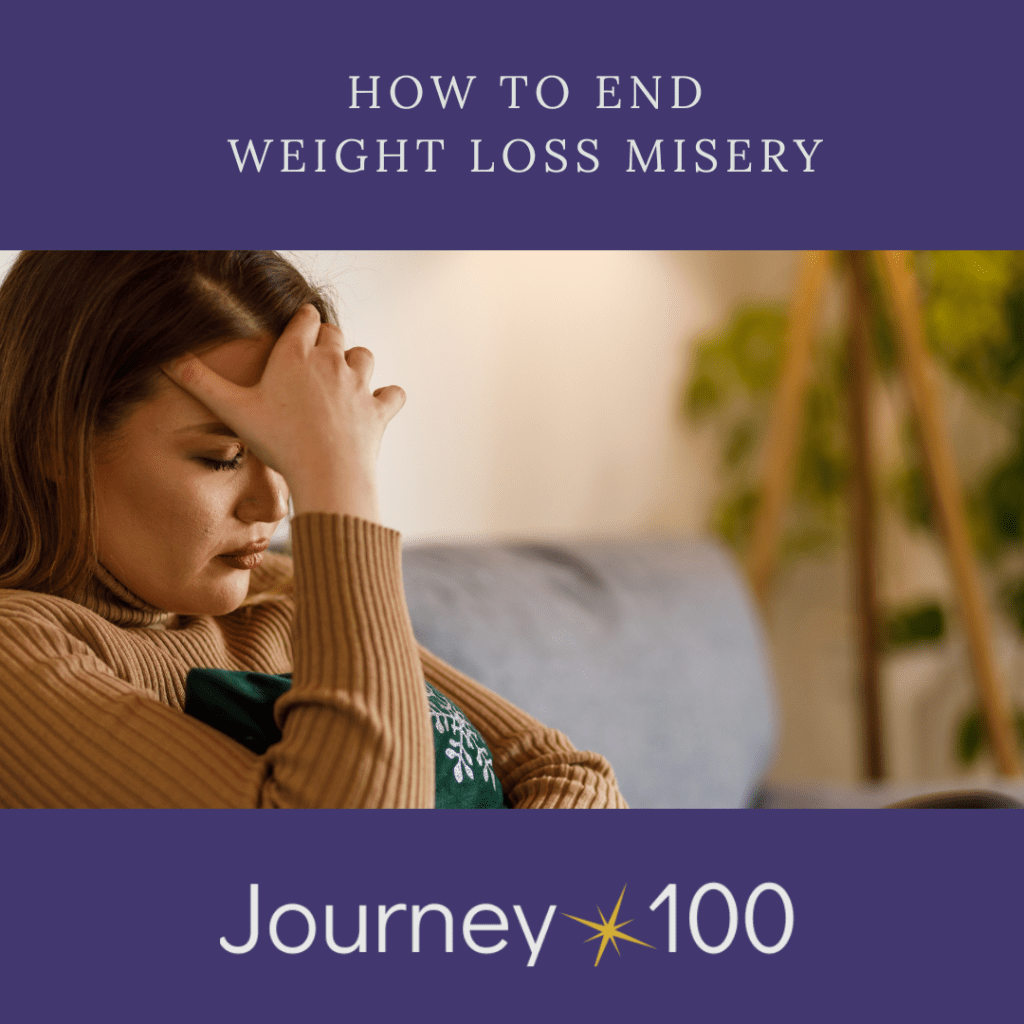
Does weight loss feel miserable? For many of us, the answer is a resounding YES! Keep reading for how to end weight loss misery. Many of us approach weight loss with a list of “rules” that make it feel like yet another chore—something we have to do. But what if I told you there’s a way to make this journey feel lighter, more enjoyable, and even empowering? It all starts with one simple mindset shift: replacing “I have to” with “I get to.” Whenever I was on a diet, everything felt like a burden: “I have to skip dessert.” “I have to find time to exercise.” “I have to cook something healthy.” Each “have to” made me feel resentful, like I was punishing myself for not being good enough. But then, I decided to shift my thinking. What if these weren’t obligations? What if they were opportunities? Suddenly, “I have to” became: “I get to nourish my body with wholesome food.” “I get to move and strengthen my body in ways that feel good.” “I get to choose habits that support my energy and health.” This small change made a huge difference. Gratitude turned my weight loss journey into an act of self-love rather than just another to-do list item. When you approach your choices with gratitude, everything shifts: Empowerment, Not Obligation: You’re no longer forcing yourself to follow rules. You’re choosing actions that care for your body and health. Enjoyment Instead of Resentment: Gratitude reframes healthy habits as privileges rather than punishments. Long-Term Fulfillment: Instead of chasing short-term results, you’ll start appreciating the process itself—how good it feels to take care of you. Ways to Use Gratitude in Your Day Here are some simple ways to weave gratitude into your weight loss journey: Start Your Day with Gratitude As you write your daily plan, write a few things you are grateful for from the previous day. This is a great time to take notice of the non-scale victories. Reframe Tough Moments When you’re tempted to skip a healthy choice or feel like giving up, reframe the moment: “I get to prepare a meal that fuels me and supports my energy.” “I get to pause and choose what’s best for me right now.” “I get to choose progress.” Celebrate What You Have Focus on what your body can do right now, not just what you want it to be. “I’m thankful for my legs that carry me, my heart that beats, and the strength I’m building with every step.” “I’m thankful for the breath in my lungs.” “I’m thankful to have a body to experience this world in.” By shifting from “have to” to “get to,” you’re no longer approaching your journey with a sense of dread. Instead, you’re celebrating your ability to care for yourself and make positive choices. This mindset makes the process more enjoyable and helps you stay consistent because you want to do these things—not because you’re forcing yourself to. The beauty of gratitude is that it reminds you how much you’re already capable of and how far you’ve come. It’s a way of saying, “I’m doing this because I deserve to feel good, inside and out.” I hope this small mindset shift gives you a new perspective and renewed hope for your weight loss journey. You don’t have to do anything—you get to take steps that nurture and love the amazing woman you are. Your Coach, Andrea
How to vacation and still lose weight

Many of us look forward all year to traveling, relaxing, and indulging in delicious food on vacation. If you’re on a weight loss journey, you might be wondering: how can you go on vacation and still lose weight? The great news is with a bit of planning, you can enjoy your vacation and STILL lose weight. Finding Balance on Vacation Vacation is a time to unwind, explore new places, and create lasting memories with loved ones. It doesn’t mean you have to give up on your healthy habits. In fact, a balanced approach will help you feel your best both physically and mentally when you return home. Here are five helpful tips to prioritize healthy foods and stay hydrated while enjoying your getaway: 1. Stick to a Routine: While it’s tempting to completely let go of your routine, maintaining some consistency in your meals can make a big difference. Start your day with a nutritious breakfast, such as yogurt with fruit, oatmeal, or eggs. Having a healthy foundation sets a positive tone for the rest of the day. On my most recent trip to Costa Rica, I brought my vitamins to take each morning as well as protein powder to ensure I was keeping my protein intake on target. 2. Prioritize Water: Staying hydrated is crucial, especially if you’re in a hot climate or doing lots of activities. Carry a reusable water bottle with you and sip water throughout the day. Not only does it keep you hydrated, but it also helps control hunger and reduce the chances of mistaking thirst for hunger. I have a special water bottle that is strictly for travel. It has a flip-up straw that means it is perfect for throwing in my bag without worrying it will leak. 3. Choose Wisely at Restaurants: When dining out, look for menu items that are grilled, baked, or steamed rather than fried. I generally enjoy one indulgence per day, which means one fried item OR one sugary treat. Enjoy your favorite indulgences, but balance them with healthier choices to ensure you can continue to lose weight while on vacation. 4. Pack Healthy Snacks: Bring along some healthy snacks for the journey and your daily adventures. Nuts, seeds, fruit, and whole-grain crackers are great options. Having nutritious snacks on hand can prevent you from reaching for less healthy options when hunger strikes. I often pack myself containers full of oats, chia seeds and protein powder to prepare easy overnight oats. I also use snack sized Ziplock bags to put individual servings of protein powder so I can keep my protein intake up even on vacation. 5. Enjoy Mindful Indulgences: Part of the joy of vacation is trying new foods and indulging in treats. The key is to do it mindfully. Savor each bite of that gelato or pastry. Choose the treats you really love and enjoy them without guilt. Balance indulgent moments with nutritious meals to keep your energy levels up and regret at bay when you return home. Remember, vacation is about more than just food. It’s a time to connect with loved ones, explore new places, and create unforgettable memories. One of my most memorable moments on my Costa Rica trip had nothing to do with food. I had the pleasure of ziplining above the canopy of their rainforest! The views were absolutely spectacular and it was truly a humbling moment when I realized that at my highest weight I would have not been eligible to do enjoy that activity. Here are some ways to focus on the joy of your trip: Stay Active Incorporate physical activities you enjoy, such as walking, hiking, swimming, or biking. Also look for new activities to try like ziplining, parasailing, banana boat rides or horseback riding. It keeps you active and makes the vacation more fun. Connect with Others Spend quality time with family and friends. Share stories, laugh, and enjoy the experiences that make the vacation special. Our trip to Costa Rica was a group travel experience and it was a lot of fun getting to know the other people. Even vacationing with my family, it’s a lot of fun trying new experiences and foods together to see what each person likes or dislikes. Capture Memories Take photos, journal about your adventures, and cherish the moments spent together. These memories are far more lasting than any meal. Creating a balanced lifestyle means enjoying all aspects of life, including food. When you plan ahead and make mindful choices, you give yourself the freedom to enjoy your vacation without guilt or regret. It’s not about restriction; it’s about making choices that support your goals while allowing you to indulge in the things you love. Your Vacation Plan: Nutritious Choices: Start your day with a healthy breakfast to set a positive tone. Stay Hydrated: Carry a reusable water bottle and sip water throughout the day. Smart Dining: Choose grilled, baked, or steamed options at restaurants and balance them with your favorite indulgences. Healthy Snacks: Pack nutritious snacks to keep you fueled during your adventures. Mindful Indulgence: Savor your treats and enjoy them mindfully. Enjoy your vacation with confidence and joy. Embrace the freedom of planning ahead and making balanced choices that let you have fun and stay on track. Here’s to a fabulous getaway! Safe travels and happy adventures! Your Coach, Andrea
How to reward yourself without food
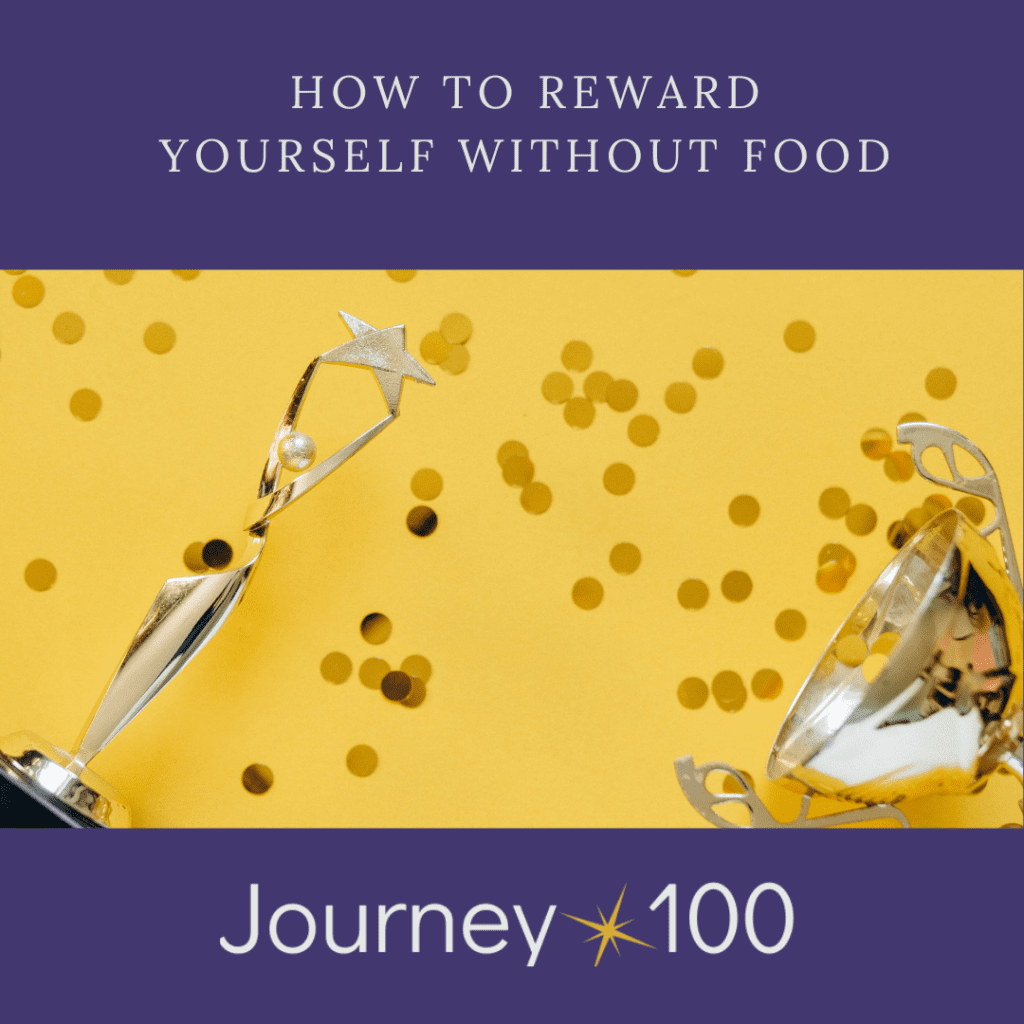
At my highest weight of 250 pounds, rewarding myself with food was an everyday event. Got through a tough meeting? Head to Starbucks for a tasty drink. Kids behaving badly and you aren’t screaming at them? Sneak a few Oreos from the pantry. Slayed your To-do list like a boss? Toast yourself with a glass of wine. It’s so important to learn how to reward yourself with non-food items as rewarding yourself with food works against weight loss. Below, we’re diving into how to reward yourself without food to make your weight loss journey not just successful but also enjoyable. Here are some non-food rewards to treat yourself as you crush your goals: Free Rewards: Take a relaxing bubble bath. Watch a favorite movie or TV show. Read a book in a quiet corner. Meditate for 15 minutes. Practice yoga or stretching exercises. Go for a nature walk. Sunbathe in a park. Listen to your favorite music or podcast. Do a DIY spa day at home. Write a Thank You letter to yourself. Under $20: Buy a new journal or planner. Get inspirational stickers for your water bottles. Purchase a scented candle or essential oils. Treat yourself to a new workout shirt. Buy a new book or e-book. Get a massage ball or foam roller for self-massage. Try a new skincare or beauty product. Invest in a quality water bottle. Buy fresh flowers for your home. Get a new houseplant. Under $50: Book a manicure or pedicure appointment. Treat yourself to a massage. Buy a subscription to a meditation or mindfulness app. Buy a new workout outfit. Purchase a quality yoga mat. Try a new outdoor activity – stand up paddle boarding, kayaking, pickleball, etc. Try a virtual cooking class. Buy yourself a charm bracelet to add charms for every 10 pounds lost. Buy a new piece of clothing you’ve been eyeing. Buy a smart scale. Over $100: Book a professional photoshoot – especially great when you reach your goal weight! Treat yourself to a weekend getaway. Join a boutique fitness center. Get a personalized nutrition consultation. Treat yourself to a luxury skincare set. Book a session with a personal trainer. Purchase a new fitness gadget – Garmin, Fitbit, Apple watch, etc. Buy tickets to a live event or concert. Get a set of adjustable weights. Splurge on a new wardrobe! Remember, learning to reward yourself without food not only will help you lose (and keep off!) more weight but it helps the process feel more enjoyable. As a human being we seek pleasure. By making your weight loss journey more pleasurable, you are more likely to stick to the process, get to your goal weight and enjoy it! Which non-food reward will you try? Your Coach, Andrea
How Sleep Helps with Weight Loss

For many busy women, we find that extra time in our day to workout or meal prep by getting up earlier or staying up later. But are we actually doing ourselves a favor when it comes at the cost of our sleep? In this blog post, I will uncover for you how sleep helps with weight loss. Why Sleep Matters Metabolic Magic: Your body regulates hormones that control hunger and fullness while you sleep at night. Inadequate sleep disrupts this delicate balance, leading to increased appetite and cravings for high-calorie, sugary foods. Energy Drain: Ever notice how sluggish you feel after a restless night of sleep? Sleep deprivation zaps your energy levels, making it challenging to stay active and motivated to exercise. You are also more likely to crave those foods that give you quick bursts of energy (i.e. simple carbs and sugary foods) but don’t offer much nutritional value. Stress Sabotage: Lack of sleep can trigger stress hormones like cortisol, which not only make you feel anxious but can also lead to fat storage, especially around the belly area. How to Improve Your Sleep Habits and Your Weight Loss Now that we’ve established how sleep helps with weight loss, let’s talk about some practical steps you can take to ensure you’re getting the sleep you need. 1. Set a Sleep Schedule: More than likely, you have a routine during the workweek but it’s also important to aim for consistency on weekends too. Try to go to bed and wake up at the same time each day, even on weekends. This routine in your sleep patterns helps you fall asleep faster and wake up more refreshed as your circadian rhythm remains consistent. 2. Create a Relaxing Bedtime Routine: Wind down before bed with calming activities like reading, gentle stretching, or a warm bath. These rituals signal to your body that it’s time to get ready for sleep. I enjoy reading fiction before bed as a way to get out of my own head and get enveloped in another storyline. It helps to detach from my perceived problems or to-dos. 3. Limit Screen Time: The blue light emitted by phones, tablets, and TVs can interfere with your body’s natural sleep-wake cycle. Try to avoid screens at least an hour before bedtime. This could be a great challenge to explore new hobbies such as Zentangles, knitting or yoga. 4. Cut the caffeine: Avoid caffeine too close to bedtime. This might take a little trial and error to find the cut-off time that’s right for you. I personally stop drinking caffeinated drinks at 5pm and have found that I go to sleep much easier now at my bedtime of 10:30pm. 5. Make Your Sleep Environment Cozy: Ensure your bedroom is conducive to sleep by keeping it dark, quiet, and cool. I set our thermostat to four degrees cooler than we keep it during the daytime as well as I use a ceiling fan at night for both cooling and white noise. I even ask Alexa to turn off her screen as we go to bed and put my phone face down to eliminate extra light. 6. Manage Stress: Practice relaxation techniques like deep breathing, meditation, or gentle yoga to calm your mind before bedtime. I like journaling in the evening to help take any racing thoughts and putting them down on paper. I often tell myself that my thoughts are now written down and I can come back to them tomorrow. Celebrating Your Progress Remember, the journey to better sleep habits is all about progress, not perfection. If you’ve struggled with sleep in the past, don’t be too hard on yourself. Celebrate the small wins along the way, like going to bed 15 minutes earlier or choosing to read rather than watch TV before bedtime. These victories are building blocks toward better sleep and achieving your weight loss goal. By prioritizing restful nights and making small changes to improve your sleep habits, you’ll be better equipped to achieve your weight loss goal with energy, focus, and a clearer mind. You’ve got this! Your Coach, Andrea
How to stay on track over the weekends

For so many of my clients, weight loss seems to be easier Monday through Friday. There is structure and routine. During the week, it is easy to be focused but once the weekend comes, routine goes out the window! Here are five ways you can stay on track over the weekends: Make a plan While Saturday and Sunday might look different from the workweek, you probably have a general routine. Maybe you don’t wake up as early but you still get up around the same time every weekend. If you’re like me, you have kids that have sports the same time each weekend too. If you take five minutes at the start of each weekend day and brainstorm your commitments, where you will be for each meal time, and available options for food, you’ll be off to a good start in making a reasonable plan for yourself. Another important part to remember is making sure you stay hydrated over the weekend so make a plan for that too. Will you carry a water bottle around with you? Will you fill multiple water bottles and stash them around the house to remind you to drink water? Remembering to stay hydrated over the weekend will help you feel your best, have more energy and prevent snacking due to faux hunger (thirst). Anticipate the unexpected Weekends are more flexible and sometimes spur of the moment changes happen. That’s OK. You can be spontaneous and still make progress towards your weight loss goal. A spontaneous trip for ice cream doesn’t mean you have to order the largest sundae with extra chocolate fudge and whipped cream. In fact, a spontaneous trip for ice cream doesn’t actually mean you have to have ice cream at all. My 90 pound weight loss definitely included ice cream but sometimes it also included just loving the joy on my kid’s faces and being present in the moment without having any ice cream. Think about the past few months, what came up over the weekend that you threw you off your weight loss game? Make a plan for how you would ideally handle that if it came up again. Chances are those same challenges will present themselves again in the future. When you mentally rehearse for them, you’ve given yourself the instructions on how you want to handle it so you are better equipped for next time. Create a back on track plan Maybe you went face down into a pepperoni pizza and didn’t come back up until it was all gone. Maybe you’re feeling like you messed it all up and so you might as well eat whatever you want for the rest of the weekend. But hold on! Getting back on track is as much of an option as throwing in the towel is. You are a human being and sometimes you are going to make choices you wish you hadn’t. That’s OK. But don’t dwell there. Create a plan for yourself that helps you get back on track quickly. For me, I love to drink a glass of water and then go for a 15-minute walk. The hydration and moving my body really help to clear my mind. Plus it is two quick wins that I can feel good about! To create your back on track plan, think of one or two things you can do no matter where you are to help get quick win and get your head back in the game. Think something new So many of my clients like to say that the weekends are just harder. But says who? Sometimes we are just committed to the idea that they are harder simply because that’s what we always believed. How could they actually be easier? On the weekends, you may not have the structure and routine of the week but you might have a lot more time to workout, make a food plan or eat more slowly and enjoy your meals. Asking yourself how the weekends can be easier opens your mind to find more evidence that it actually IS easier. Encourage yourself to find ways that losing weight is actually easier over the weekends. Be patient with yourself If weekends have been a struggle for you, please be patient with yourself. Like learning anything new, these things take time. You won’t miraculously start going through your weekends flawlessly. You might still forget to drink water, make a food plan or move your body. That’s OK. The goal is progress, not perfection. If you do one thing better than the weekend before, cheer yourself on! Yay you! Then build on that winning momentum the next weekend. When you feel like you are winning, you keep trying. When you feel like you are losing, you quit. Look for your wins. Keep trying. And eventually you will learn to stay on track over the weekends and meet your weight loss goal. Your Coach, Andrea
How to make weight loss easier
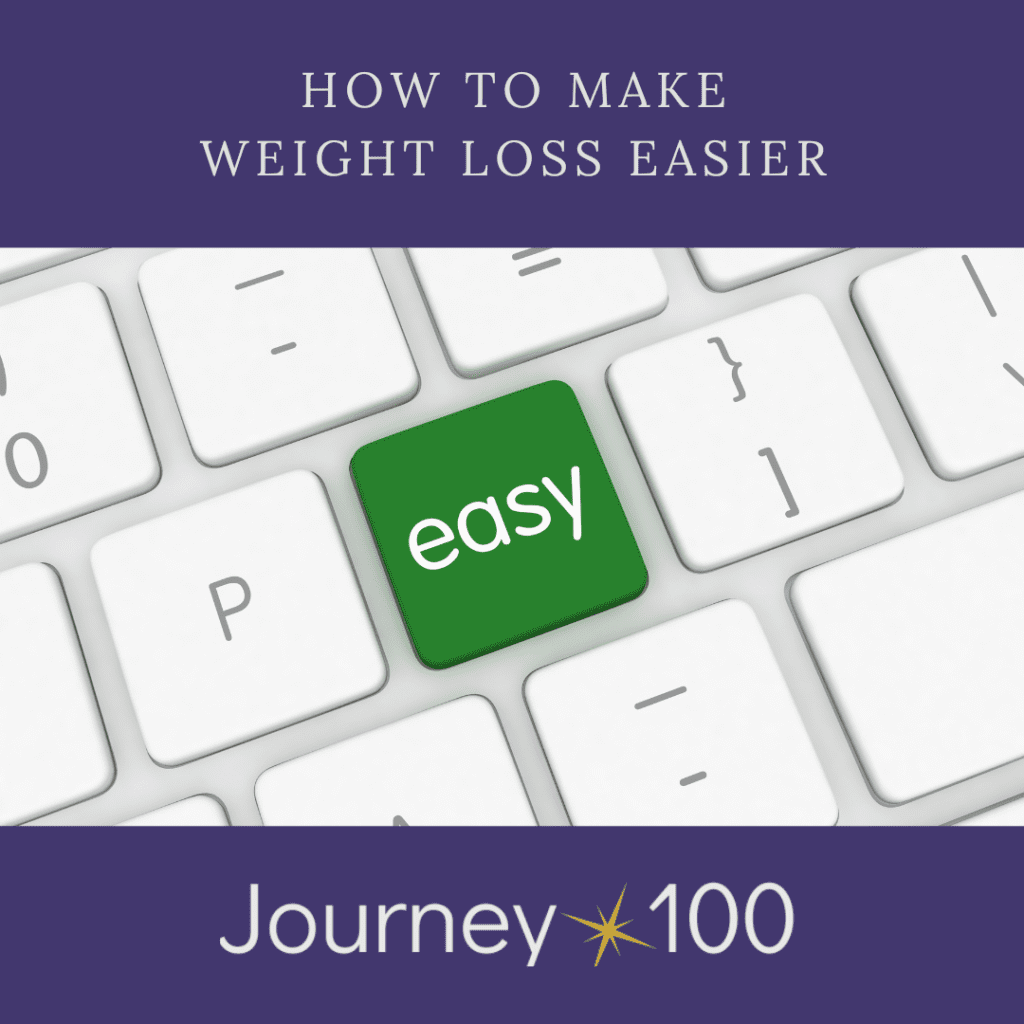
Who wants weight loss to feel easier? All of us. When you think of weight loss, do you envision calorie counting and working out for hours at a time? Maybe it’s cleaning out the pantry and swearing off your favorite foods? For so many of us, weight loss is a nasty list of to-do’s that feels hard. And when weight loss feels hard we convince ourselves that we need something magical like motivation or a special Monday to get started on it. But weight loss doesn’t have to be hard. Weight loss can feel a whole lot easier in just a few steps. Quit calling it hard Weight loss will feel infinitely easier if you stop calling it hard. Now before you write this off as ineffective, hear me out. Your brain has an amazing thing call the Reticular Activating System (RAS). The RAS filters the information that comes through our brain as important or unimportant. So in a busy restaurant, it filters out all the conversations around you until you hear someone shout your name, then you turn and pay attention. The RAS is tuned into your name as an important piece of information so it can pick it out of a noisy restaurant. When you tell yourself over and over that weight loss is so hard, your RAS takes that as important information and goes to look for the supporting evidence that losing weight is hard. For instance, it will key in on how much you sweat during a workout or how deprived you feel when you can’t have a brownie. You think weight loss is hard and your RAS finds all of the evidence of hard for you. If you quit saying weight loss is hard, your RAS will stop looking for all the evidence that weight loss is hard. Start calling it easy The next step in making weight loss feel easier is to call it easy. Hold on…I can hear you now….. but it’s not easy! Ok. But are some parts of it easy? Be sure to point that out to yourself. Even if it is just filling up your water bottle, remind yourself that was easy. Driving to the gym? That was easy. Maybe you completed a workout and it didn’t kill you like you thought it would, tell yourself “That was easier than I thought it would be.” Give your RAS the challenge of finding easy things about weight loss and pretty soon you’ll be feeling that weight loss doesn’t feel as hard as it did before. Make it enjoyable Typically the things you enjoy in life are things you want to do more often. Enjoyable tasks are not difficult or hard. What can you do to make weight loss more enjoyable? Start thinking outside of the box. Weight loss doesn’t have to be cutting carbs and running long distances. Think about what you really enjoy eating and drinking. Is there a way to modify them to make them healthier? What exciting, healthier recipes are out there just waiting for you to try them? Another sure fire way to make weight loss feel easier is only moving your body in ways you actually enjoy. Running or the stair machine are not your only options. There are literally thousands of options out there. Walking, chair yoga, Zumba, water aerobics, pole dancing or Tai Chi to name a few. There are different speeds and flavors for everyone. When movement is enjoyable, it makes weight loss feel easier and you’re more likely to stick with it. Need more ideas? Check out this blog post. Recognize your accomplishment I find it so much easier to do things for my family when they give me a quick Thank You for my efforts. When was the last time you thanked yourself for making healthy choices? We all want to feel like what we do matters. Recognition does a long way in increasing the chance we repeat that action. Have you ever thought about why you can’t stop yourself from reaching for the potato chips or the chocolate? It’s because it feels good! They are tasty, the experience of eating it is fun and afterwards we get a dopamine hit. When you are losing weight we often have to resist those foods that we love and are so fun to eat. And what’s the reward?? Getting to resist it the next time we want it too. Giving yourself recognition when you make a healthy choice is paramount to making weight loss feel easier. When you recognize your efforts and give yourself a pat on the back, you want to do more of that activity in the future. And don’t just stop at the proverbial pat on the back. Find other ways to recognize yourself. Plan for rewards after a certain number of workouts completed or pounds lost. Give yourself a high five in a mirror and say “I’m proud of me!” So give yourself a Thank You. Even if it was just for reading this blog post and opening your mind to the possibility that weight loss can be easier. Your Coach, Andrea
Creating consistency in weight loss
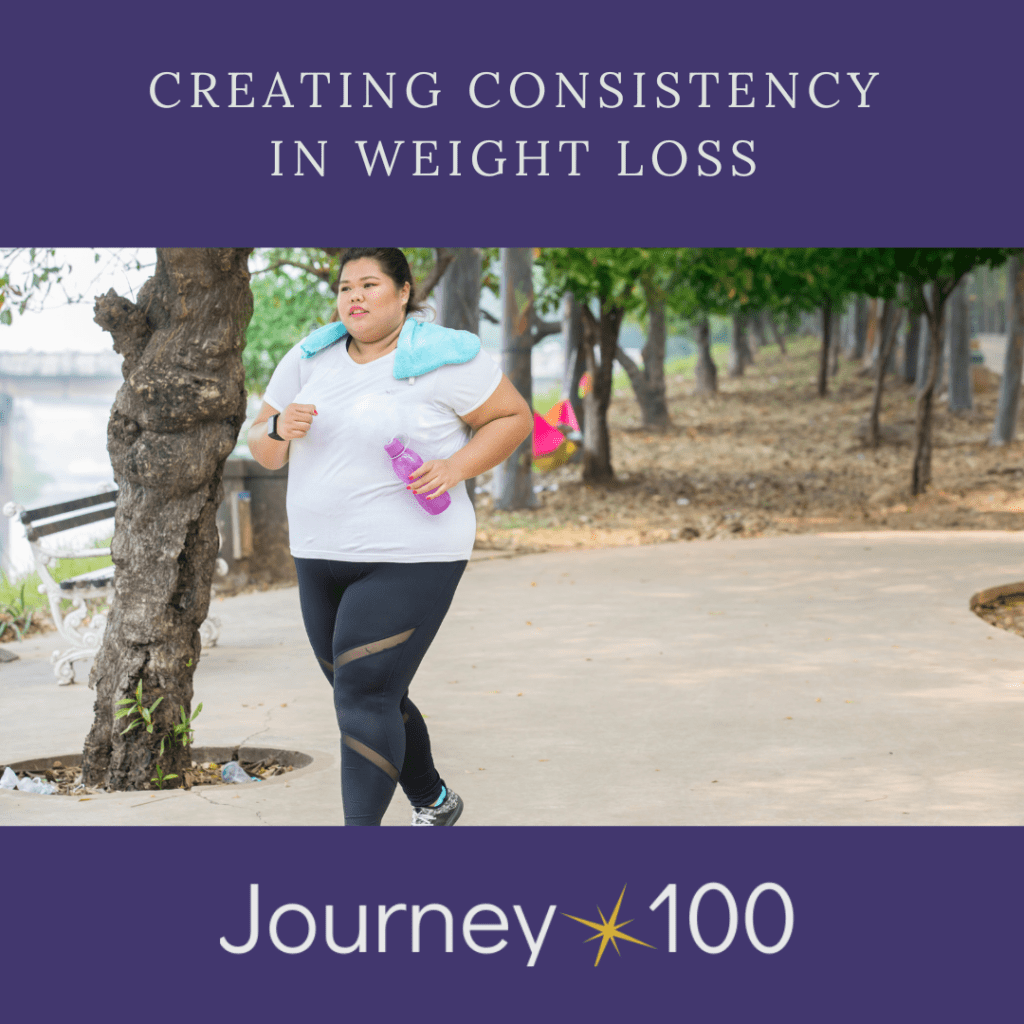
Action is the currency of weight loss. You can’t do the same things you’ve always done and expect different results. And you most certainly cannot take different actions only once in a while and expect consistent results. If you want to reach your weight loss goal, you must be consistent. Consistency is what I coach clients on the most and so I have put together this list of five things you need to know for creating consistency in weight loss. Consistency is NOT perfection My clients often say they are not able to be consistent, when really they are being pretty consistent. Let’s say the goal is to drink 64oz of water each day and they are only doing it five days, instead of seven. Hate to break it to you but that IS being consistent. That is consistently meeting the goal for five days. There is a difference between wanting to increase the number days you meet the goal and being consistent. Too often we believe we are not being consistent in weight loss when we aren’t perfect. But that’s not the case! Consistency does not equal perfection. In fact, thinking you are not consistent because you aren’t perfect is defeating and causes you to quit. So recognize when you ARE being consistent and that will increase your desire to continue to be consistent as well as take more positive action towards your weight loss goal. Only make small, doable changes I get it. Being overweight can feel terrible. There is likely an urgency to want to be thinner NOW. But when you try to change everything about you, your routines, the foods you eat and the life you live, it takes a lot of energy and won’t last for long. Too many weight loss journeys fail because they are trying to use willpower to muscle through changing everything about themselves and their lives. Don’t do that to yourself. The greatest gift you can give yourself is acceptance of where you are. Take the pressure off of needing to be anything else. You can accept where you are and still make positive change. The best way to make that positive change is to make the changes small and level up when you get really good at that change. Small, doable changes make weight loss feel really manageable and allows you to collect tons of wins. And when you are winning, you know what? You feel like taking more action. And taking more action leads to more weight loss. Use multiple ways to measure your success The scale is not king of your weight loss journey. The diet industry has brainwashed us all by using the scale as the number one measurement of success. But you’re setting yourself up for defeat if that is the only way you measure your weight loss. Scales are a lagging measure of the actions you take. It may take weeks for the scale to reflect the fruits and veggies you’ve been eating or the workouts you completed. I highly recommend using a habit tracker to measure your actions and use that as a sign of your weight loss progress. You can also track your moods, body measurements, clothing fit and use before and after photos too. Expect to not feel like it Consistency often wains when we “don’t feel like it.” But what if “feeling like it” wasn’t required? What if you could take action anyway? Well, you can! It’s great to feel motivated and excited when you first start a new diet or exercise plan, but once that wears off and boredom sets in, it can feel difficult to keep taking action. It has taken over 3 years for me to reach my weight loss goal. There have been a lot of times that I didn’t want to work out or eat the food I planned. And you know what? I was still able to do it. When motivation wains (and it will), you have to be able to rely on commitment and discipline to see it through. One of the greatest gifts you can give yourself is to remain committed and disciplined through that time. As you continue to take action, even when you don’t feel like it, that motivation will return and this time with a giant side of pride. Remain focused and keep going no matter what When you focus on the problem on your weight loss journey, you’ll find more of them. When you focus on the solutions, you’ll find more weight loss. Recognize when you are being inconsistent and figure out what you can do to become more consistent. Focusing on how to be more consistent creates more consistent action and more consistent results in your weight loss journey. When I started my weight loss journey in 2019, I simply decided that I was going to figure it out no matter what. When I overate or missed a workout, I got curious with myself and figured out how to move forward. You can choose the same. There is no need to beat yourself up for being inconsistent. Remain focused on your weight loss goal and allow yourself to be curious and find a different way going forward. After all, if you continue to do the same things, you’ll get the same results. What’s getting in your way of being consistent? Your Coach, Andrea
The ONE thing you need to start losing weight
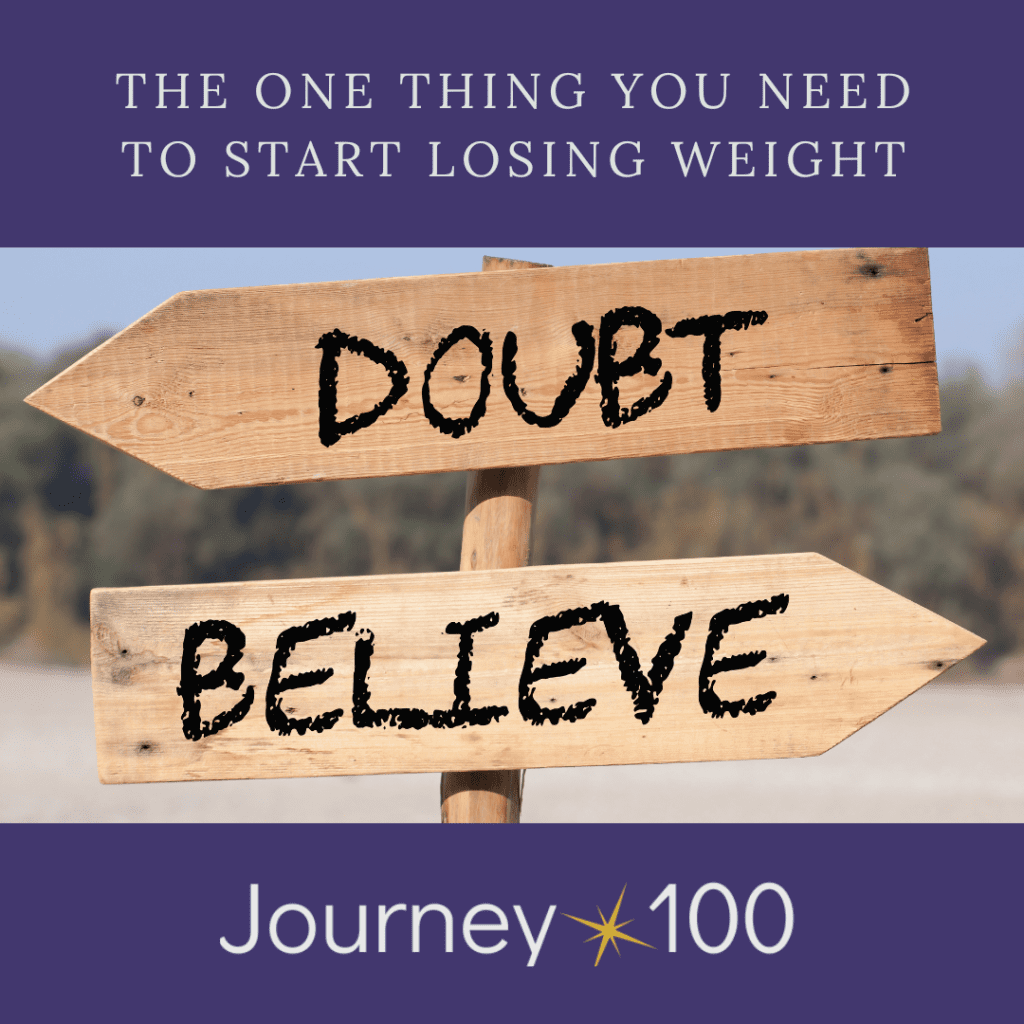
People overcomplicate weight loss all the time. But to get started and to keep going, you really only need one thing: Belief. It’s absolutely true. Believing that you can lose weight is the ONE thing you need. You don’t need a food scale, a bathroom scale or a calorie counting app to get started. All you need is to believe. You might be thinking, it’s really not that easy. But I promise that to begin your journey, that’s all you need. You would never start a diet if you didn’t believe YOU could do it. You would never start an exercise routine unless you thought YOU were capable of getting results from it. It all starts with belief. And you know what? It all ends when belief goes away. You stop following the diet when you believe it is no longer working. You stop working out when you stop believing that you’ll get the results you desire. Belief is the fuel for you weight loss journey. When you believe in yourself and the ability for you to get results, you take action. If that belief falls away, then you stop taking the action. It was a very powerful moment in my life when I realized that belief was fueling everything. I had experienced success on diets before and couldn’t seem to figure out why I eventually stopped being successful and put the weight back on. Then one day it hit me: I quit believing in it and stopped taking action. There was nothing wrong with me. I wasn’t broken. I wasn’t doomed to be fat for the rest of my life. I simply stopped believing. Just as easily as I can choose to believe in something, I can choose not to believe too. And whether or not I believe, determines how I’m showing up and the results I get. As scary as that might seem, it’s actually the best news ever. I no longer had the responsibility of finding the perfect diet or exercise plan. I simply needed to practice belief. Belief in myself and belief that I could figure this out no matter how long it took. With those beliefs I found safety in trying new things and seeing what worked well with my life. I was able to look at my habits and see which ones were helping on my weight loss journey and which ones weren’t. I could take my time and figure it out because I had the belief that I would figure it all out and reach my weight loss goal no matter what. If you are struggling with belief in yourself, here are a few things to try: Read other people’s weight loss success stories for inspiration Write a list of 100 things you’ve been successful at (nothing is too small) Use motivational quotes to inspire you Begin with practicing the thought “I’m willing to believe I can do this” Reach out for help by scheduling a call with me! How do you practice belief in yourself? Your Coach, Andrea
